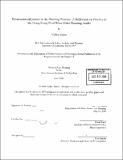Environmental justice in the planning process : a reflection on practice in the Hong Kong-Pearl River Delta planning studio
Author(s)
Taylor, Yadira (Yadira Janet), 1975-
DownloadFull printable version (3.868Mb)
Other Contributors
Massachusetts Institute of Technology. Dept. of Urban Studies and Planning.
Advisor
David Laws.
Terms of use
Metadata
Show full item recordAbstract
Environmental justice is a set of historical claims about the inequities produced as a result of human settlement, industrial facility siting, and industrial development. It is defined as the fair treatment and meaningful involvement of all people regardless of race, color, national origin, or income with respect to the development, implementation, and enforcement of environmental laws, regulations, and policies. In the United States, it is low-income residents and people of color who bear a disproportionate amount of these environmental and health burdens. These outcomes may be tied to tacit characteristics of planning processes that practitioners have little access to. The environmental justice movement has been focused too much on these outcomes and in reactive organizing against locally unwanted land-uses, and not enough on the processes that produced these outcomes. By observing and reflecting on practice, it is possible to determine how environmental justice problems are influenced by the internal character of planning and decision-making processes. The Hong Kong/Pearl River Delta Planning Studio at the Department of Urban Studies and Planning at MIT is designed to prepare students for professional practice. If we learn about practice in studio, then it makes sense that the experience can also provide access to the tacit characteristics of practice that shape the way planners perceive and act on concerns about environmental justice. Through my reflections as both a participant and observer in the studio, I hope to discover what we as "planners" actually do and what are the ways that environmental justice is pre-configured in the patterns, commitments, and resources of practice. I have organized my observations into the following six categories or "moments in practice": 1) deadlines, episodes, and commitments, 2) organizational demands, 3) individual initiative and common knowledge, 4) client vision, 5) resources, and 6) project boundaries. These categories describe the major "moments" or instances during the studio that I found to be the most critical in that they presented either impediments to or opportunities for environmental justice.
Description
Thesis (M.C.P.)--Massachusetts Institute of Technology, Dept. of Urban Studies and Planning, 2000. Includes bibliographical references (leaves 61-62).
Date issued
2000Department
Massachusetts Institute of Technology. Department of Urban Studies and PlanningPublisher
Massachusetts Institute of Technology
Keywords
Urban Studies and Planning.